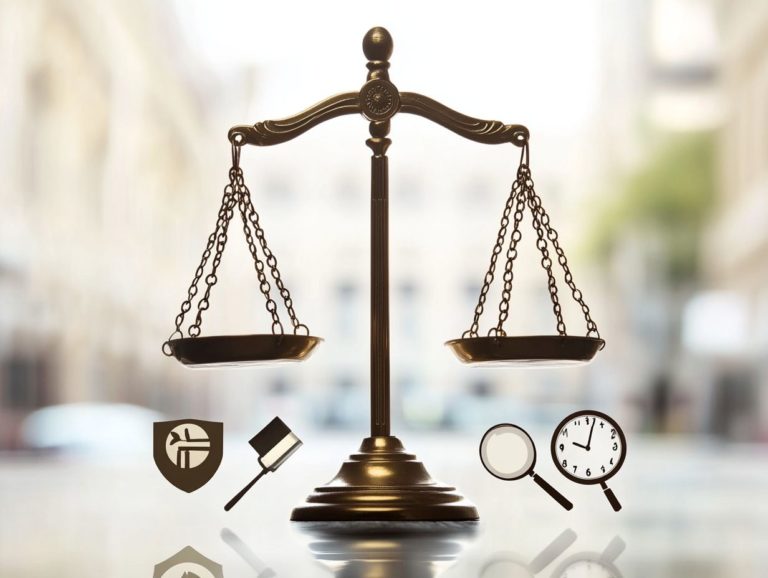Understanding Legal Jargon: Your Rights
Legal jargon may seem tricky, but understanding it is your key to protecting your rights!
This article demystifies the significance of legal terminology while clarifying common terms and phrases. It also highlights your essential rights and protections. Additionally, it delves into how misunderstandings of legal jargon can influence your rights and offers practical tips for navigating this complex language.
By the end, you will be better equipped to navigate the legal landscape and advocate for yourself with confidence.
Contents
- Key Takeaways:
- Common Legal Terms and Phrases
- Understanding Your Rights
- How Legal Jargon Affects Your Rights
- Navigating Legal Jargon
- Frequently Asked Questions
- What is legal jargon and why is it important to understand?
- What are my rights as a citizen?
- Can legal jargon vary from state to state?
- What should I do if I don’t understand the legal jargon in a document?
- Can legal language be used to confuse or deceive people?
- Is it possible to negotiate the language in a legal document?
Key Takeaways:
Here are the most important points to remember:

Legal jargon can be complex and confusing. However, it is essential to understand it to protect your rights. Knowing common legal terms and phrases can help you navigate legal documents and discussions. Misinterpretation of legal jargon can have serious consequences, so it is important to take the time to fully understand your rights and protections.
Defining Legal Jargon and its Importance
Legal jargon is the specialized language that permeates the legal profession. It is filled with essential terms, phrases, and definitions crucial for effective communication during legal proceedings.
Grasping this jargon isn’t merely a convenience; it’s foundational for understanding your rights and obligations, navigating court processes, and engaging in legal action. This applies to both civil and criminal cases.
The significance of legal terminology extends to all players in the legal arena practitioners, judges, and defendants alike. It enhances clarity and efficiency in the system.
In various legal settings, such as court sessions and appellate courts, the impact of legal jargon becomes even more pronounced. Terms like “habeas corpus,” which allows a person to report an unlawful detention, and “subpoena,” a document that orders someone to appear in court, carry substantial weight. These terms shape how cases are processed and define individual rights within the justice system.
Clarity in this legal vocabulary not only aids in deciphering complex legal documents but also influences legal strategies and outcomes. A well-articulated argument, rich in precise legal terms, has the power to sway a judge’s opinion or lead to more favorable settlements.
This highlights why mastering this vocabulary is essential for navigating the legal landscape effectively.
On the flip side, ambiguity in legal language can cloud intentions. This potentially results in costly misunderstandings or unfavorable rulings, underscoring the necessity of mastering this specialized vocabulary.
Common Legal Terms and Phrases
You will often encounter common legal terms and phrases in various legal contexts. These elements are essential for grasping the intricacies of court proceedings, whether in civil lawsuits or criminal cases.
Understanding this vocabulary enables you to navigate the legal landscape with confidence and clarity.
Explanation and Examples
Legal definitions often benefit from practical examples, particularly when it comes to terms like “affidavit” and “testimony documents,” which are pivotal in legal proceedings.
For instance, an affidavit is essentially a written statement confirmed by oath or affirmation. It is utilized as evidence in court, often detailing a witness’s account of events. Imagine a scenario where a party relies on an affidavit to substantiate facts in a contract dispute; this document lays out the witness’s knowledge and verification of the pertinent events.
Similarly, testimony documents are statements rendered under oath in court. They serve to bolster claims made by either party. A clear example of this can be observed in criminal trials, where eyewitnesses present their testimony documents to support the arguments of the prosecution or defense.
The credibility and clarity of these documents can significantly shape the outcome of the case, underscoring their crucial role in the judicial process.
Understanding Your Rights

Grasping your rights is crucial in any legal context, as it serves as the foundation of legal relationships.
This understanding gives you the power to effectively navigate your rights and obligations within the judicial system.
Key Rights and Protections
Key rights and protections are firmly established in law to ensure fairness in legal proceedings, especially for those like you who may find themselves facing severe consequences as criminal defendants.
These safeguards are essential in preserving the integrity of the judicial system. For instance, your right to remain silent gives you the power to avoid self-incrimination. This ensures that any statements made under pressure cannot be wielded against you.
Similarly, your right to a public trial guarantees transparency. It fosters trust in the legal process by allowing for community oversight.
Protection against double jeopardy means you cannot be tried again for the same crime once acquitted. This not only reduces the chances of wrongful convictions but also promotes judicial efficiency.
Altogether, these rights uphold your personal dignity and prevent abuses of power, benefiting you in both civil and criminal cases.
How Legal Jargon Affects Your Rights
Legal jargon can profoundly impact your rights, often resulting in confusion and misinterpretation within legal documents and court proceedings. You must navigate this complex language carefully to protect your rights!
It’s essential to fully understand the implications it carries.
Potential Confusion and Misinterpretation
Confusion may arise from legal jargon, leading to significant consequences in legal proceedings. This can influence everything from court orders to binding precedent.
Consider terms like “reasonable doubt” (the standard of evidence required to validate a criminal conviction) and “preponderance of evidence” (the standard in civil cases indicating that something is more likely true than not). They are often mistaken for one another, resulting in judges and juries interpreting them differently, which can sway the outcomes of trials.
In a notable case, a misinterpretation of “malice aforethought” led to a manslaughter conviction rather than murder. This illustrates just how crucial accurate legal definitions are. Without clarity, the legal system risks unjust outcomes and undermines public trust.
This underscores the necessity for precise terminology to uphold fairness and consistency in justice.

Navigating legal jargon is essential for anyone involved in legal proceedings. You ll find numerous tips and resources at your disposal to simplify the complexities of legal language and make it more accessible.
Tips for Understanding and Using Legal Language
To truly grasp and navigate legal language, tapping into the insights of seasoned legal practitioners can be invaluable. These experts offer a treasure trove of knowledge and real-world experience that can dramatically enhance your understanding.
Engaging in formal legal education, such as workshops or online courses, provides a structured path to mastering legal terminology. Hands-on practice with sample legal documents allows you to see how terms are applied in real contexts, making their meanings clearer.
Recognizing that context is crucial in legal jargon gives you the ability to interpret these terms with accuracy and confidence. This ultimately leads to more effective communication and comprehension in legal matters.
Frequently Asked Questions
What is legal jargon and why is it important to understand?
Legal jargon refers to the specialized language used in legal documents and proceedings. It is important to understand because it defines your rights and obligations, and a lack of understanding could lead to negative consequences.
What are my rights as a citizen?

Your rights as a citizen include the right to freedom of speech, religion, and press, the right to a fair trial, the right to privacy, and many more. These rights are protected by the government and cannot be taken away from you.
Can legal jargon vary from state to state?
Yes, legal jargon can vary from state to state. Each state has its own laws and regulations, and the terminology used may differ slightly. It is important to familiarize yourself with the specific laws and regulations in your state.
What should I do if I don’t understand the legal jargon in a document?
If you do not understand the legal jargon in a document, it is important to seek help from a legal professional. They can explain the language to you and ensure that you fully understand your rights and obligations.
Can legal language be used to confuse or deceive people?
Yes, it can. Some people use complex legal terms to mislead others, especially in court.
Always turn to a trusted legal expert for help. They can clarify the meaning and impact of these terms.
Is it possible to negotiate the language in a legal document?
Yes, you can negotiate the language in some cases. A legal expert can guide you through the process and advocate for changes.






